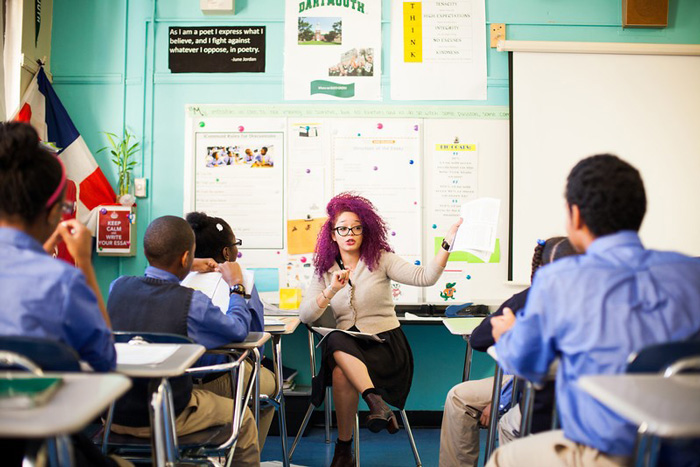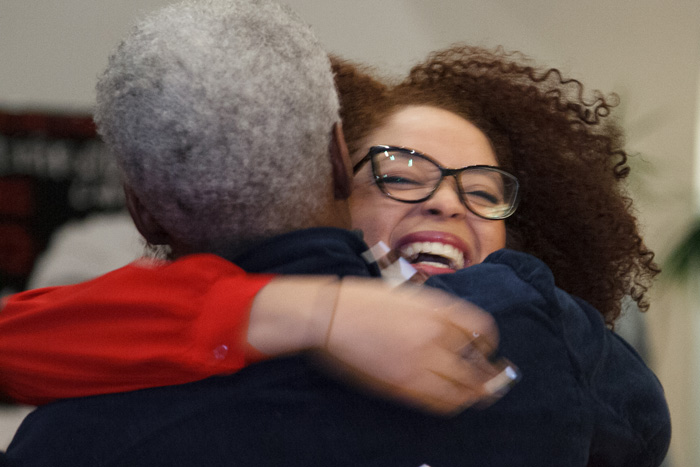Thriving and Rising

Flosha "Flow" Tejada '11
Through Uncommon Schools, Flosha “Flow” Tejada ’11 is college placement coordinator at one of three Brooklyn high schools, where it’s her mission to ensure that 100 percent of the schools’ student body advances to and through college. The former American studies major calls it her dream job, and she and her team are helping kids reach for their dreams as well: In 2016, every single student in Uncommon Collegiate Charter High Schools’ founding class was admitted to at least one four-year institution. Read on to see how Dickinson helped Tejada find her career path, as well as who and what she looks back on fondly.
Can you speak to how Dickinson’s useful liberal-arts education helped you along your career path?
During my four years at Dickinson, I had the exciting life of an explorer: diving into unknown territory, learning from my environment, absorbing and interpreting—discovering newness in every lesson, club and interaction. This, to me, is the essence of a Dickinson liberal-arts preparation! Because of it, I graduated equipped to do whatever I wanted, in a world of boundless opportunities!
What was your favorite activity/organization at Dickinson?
From sophomore to senior year I worked at the former Office of Diversity Initiatives (now the Popel Shaw Center for Race & Ethnicity). My work there gave me a sense of purpose, greater than myself. I worked alongside Paula Lima and a team of extremely diverse, talented and dynamic peers from all walks of life, who all worked tirelessly to make our campus a more inclusive place.
What jumps out as a great memory from your time at Dickinson?
It’s difficult to choose one, but the one moment that defined who I was going to be, for the next four years, was my [first-year seminar] Shared Futures, under the leadership of Professor Joyce Bylander [vice president and dean of student life]. I remember going home over winter break that year and reflecting on the books, the assignments, the dialogue … That class, and the people in it, shaped so much of what I now value, fight for and believe in
How do you stay involved with Dickinson?
I try to make myself available to current students and alumni as much as possible! Every year I successfully try to recruit Dickinsonians to work with my organization; so far there are four of us total at my high school! I am also constantly seeking to stay touch with some of the organizations and administrators who influenced my success while I was a student. Additionally, last June I was invited to speak at Spectrum’s annual Lavender Reception, and on a different occasion—Alumni Weekend—I had the special opportunity to serve as a panelist for “Activism: Then and Now.”
How did you get interested in your work, and what about it excites you most?
My work is a reflection of my lived experience. While at Dickinson, I had no idea what I wanted to be “when I grew up,” but I knew that I wanted to influence the success of students who, like me, needed a mentor, a hand, a friend or just some “realness” and guidance. What I did during my years at Dickinson, and what I dedicate my life to now, is in hopes of making my own mentors proud, all while thriving and rising above all expectations.
What is the most challenging part of your work?
The feeling of helplessness when families come to the table with unfortunate circumstances, often the product of institutionalized systems of oppression, injustice and inequality; their children’s college process often suffers as a result.
If you could have dinner with anyone, living or dead, who would it be?
Always and forever: Joyce Bylander. :)

Tejada and Bylander share a hug during one of the past Diversity Monologues. Photo by Carl Socolow '77.
You just built a time machine: Where and when do you go?
When Joyce Bylander selected me to be a Posse scholar at Dickinson. That day literally changed the trajectory of the rest of my life.
You’re going to live on an island by yourself for a year: What books, albums and movies do you take with you?
I would bring all of the book from my Shared Futures freshman seminar: The White Man’s Burden, Mountains Beyond Mountains, Pathologies of Power, Whose Water Is It?, The Omnivore’s Dilemma … and then some from [Associate Professor of American Studies] Jerry Philogene’s class! I would hope to gather advice on musical selections from [Associate] Professor [of Music Amy] Wlodarski as well as remain grounded through [Associate Professor of History] Jeremy Ball and [Professor of History] Karl Qualls’ respective historical suggestions, and finally [Associate Provost for Academic Affairs & Civic Engagement] Professor Shalom Staub’s recommendations on how to maintain balance and peace. I think that’s a pretty solid diversity of material to keep me busy and sane!
Learn more
Published March 3, 2017